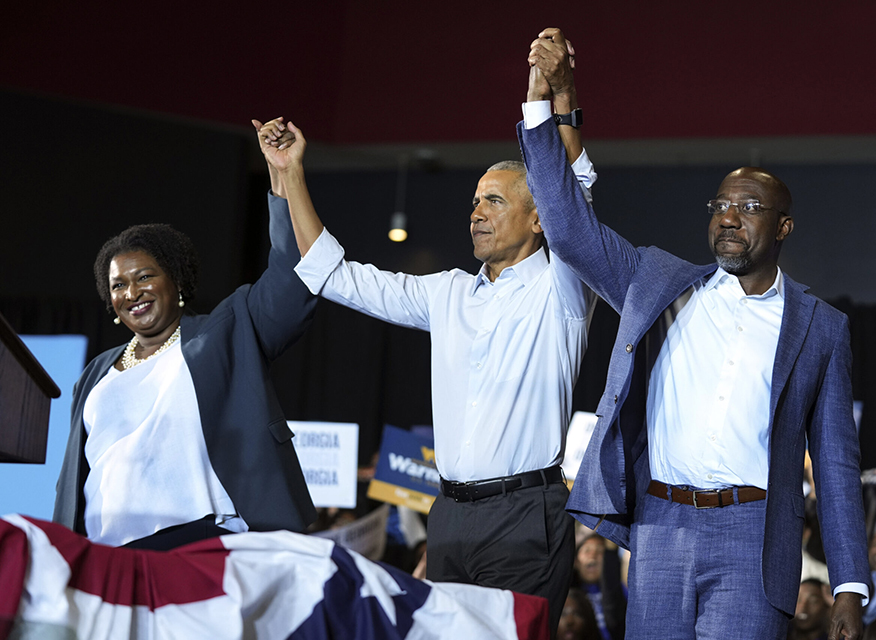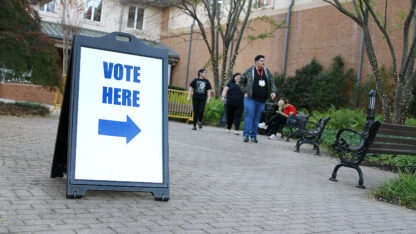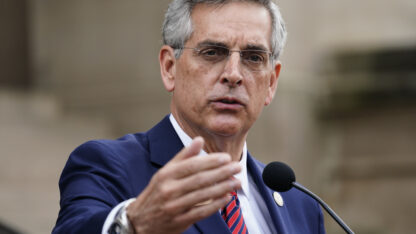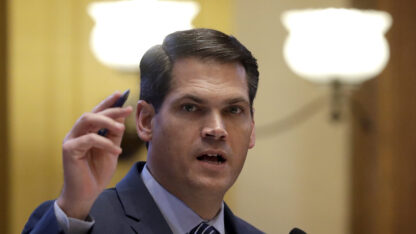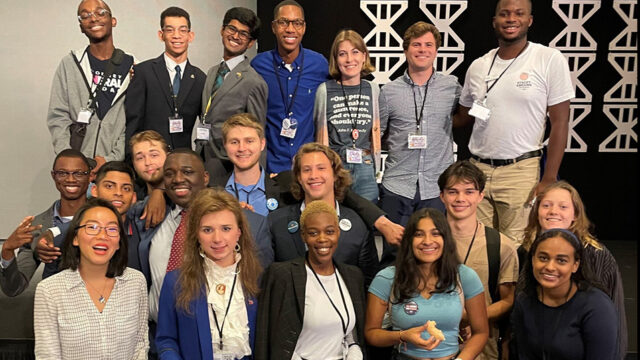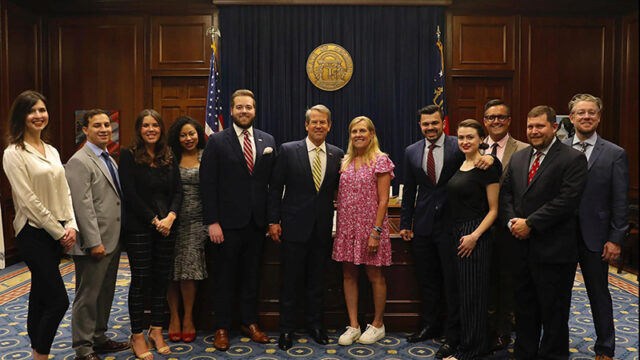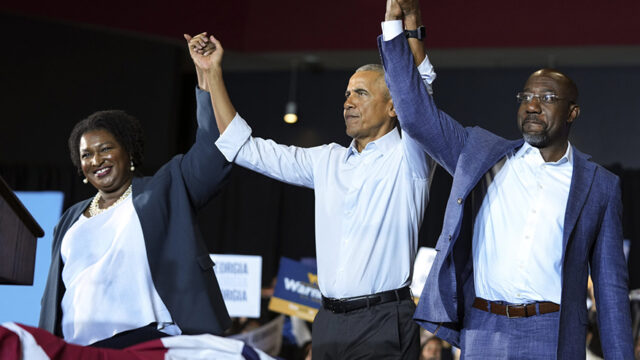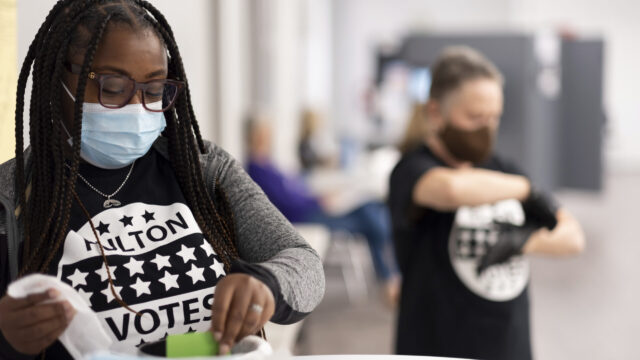With 2022’s midterm election day looming, some undecided young voters in Georgia are still deciding which candidates will best represent their own social and political views, and in the case of voters in marginalized communities, themselves.
According to the Center of Information and Research on Civic Learning and Engagement, young voters of color make up 46% of Georgia’s overall youth population, as well as 11% of the voting-age population.
Young Democrats of Georgia president Bryce Barry believes that Democratic candidates such as Stacey Abrams are essential in boosting the potential turnout of young voters of color to the polls, particularly young Black voters, who make up roughly 9% of the state.
“She’s attempting to unite and heal this state, whether it be expanding Medicaid or investing in public schools,” she said. “She’s going to actually make substantive change…you can really see her love for the people in this state.”
“Stacey Abrams is a known quantity in Georgia’s Black community and Sen. Warnock is the pastor of Martin Luther King’s church,” said student political reporter Niles Francis. “You couldn’t have two better candidates to pull that off.”
However, the 21-year-old student, who voted for both candidates, notes that despite their popularity, their hold on the young Black voters is not guaranteed.
“A lot of Black voters are being hurt by inflation, they’re being hurt by the high gas prices, they’re being hurt by a lot of the issues that Republicans are trying to hammer home in the final weeks,” he said. “If I were the Democratic candidates, I would definitely be worried within the next couple of days.”

“We are young professionals working to grow our careers and pay our bills and are now having to balance that with 8.2% inflation, 13% increase in grocery prices and continuously unstable gas prices,” said Jacquelyn Harn, the 23-year-old executive director of the Georgia Young Republicans committee.
“I think no matter what your ethnicity, or background is, or who you love, we all have some of the same problems. We don’t like paying a lot of money at the gas pump, we don’t like being afraid on our walk home,” Andrew Abbott, president of the Young Georgia Republicans, said. “We all go through the same things.”
Abbott, who identifies as Latino, rebukes the stereotyped notion that the Georgia Republican party services primarily to wealthy white heterosexual men, noting that his executive board of seven members is comprised primarily of female and Black members and that his predecessor for president was a member of the LGBTQ community.
“I don’t think that most problems are race-based. I think that representation is important, but I don’t pretend that we have the Black caucus and the white caucus and the Latin caucus and the gay caucus,” he said. “We’re just all young Republicans, and we all care about saving the lives of unborn babies and being able to have weapons so that we can protect ourselves.”
While Abbott insists that members of all races and sexual orientations are welcome within Georgia Young Republicans, some young voters wonder whether the Georgia Republican Party offers the same invitation.
Young people are more and more likely to identify as LGBTQ. More than one-in-five members of Gen Z identified as LGBTQ, according to a 2021 Gallup poll. And LGBTQ voters traditionally vote Democratic. LGBTQ voters made up 9% of the electorate in Georgia in the 2020 general election, according to an Associated Press VoteCast analysis.
Gov. Brian Kemp and Republican candidate for U.S. Senate Herschel Walker have gone harder right on LGBTQ issues in the final months of their campaigns, attending anti-LGBTQ events, misgendering transgender people and speaking out against same-sex marriage. That could motivate an increasingly larger bloc of young LGBTQ voters to head to the polls.
“You have to understand the power that your vote has. Folks were killed, folks were beaten for this right to vote because they realized how powerful it was to have a voice in this democracy.”
Bryce Barry, president of the Young Democrats of Georgia
An additional cause of concern for the Republican party’s views on marginalized voters has stemmed from the voting legislation SB 202, which Kemp signed into law last year.
The law has been criticized for making absentee voting more difficult for potential voters by shortening timelines to request and fill out a ballot, limiting the number of and access to ballot drop boxes—over 330 previously used drop boxes will not be in use in 2022—and adding identification requirements.
Decreases in drop boxes are estimated to primarily affect communities located in metro Atlanta counties such as Fulton, Cobb, DeKalb and Gwinnett, which are home to a large percentage of the state’s minority populations.
“We’ve seen so many situations of voter suppression here in Georgia, of people trying to rip away our right to vote or the way our voices are heard,” Barry said, noting that his barber was turned away by three different voting locations while trying to cast his vote last week. “And they know what happens when we use our voices. We win.”
“The four most powerful words in a democracy are ‘the people have spoken,’” said Sen. Raphael Warnock. “I believe voting rights are preservative of all other rights, and that we must make it easier, not harder, for all eligible Georgia voters to exercise their most sacred right, the right to vote.”
The questioned racial suppression among voters in Georgia has extended into high school voter registration rates between students of color and their white counterparts.
James Wenz, outreach coordinator of the Civics Center, a national nonprofit organization dedicated to registering high school students to vote, noted that a recent report examining voter registration rates of 18-year-olds and youth voter registration policies in select school districts across Georgia saw that Atlanta, Fulton, Savannah-Chatham and DeKalb, districts where the majority of students are students of color, had the lowest registration rates of the districts observed.
However, Wenz also noted that Gwinnett County, another metro Atlanta district with a diverse population, held one of the highest voter registration rates out of the districts reported on.
“I think no matter what your ethnicity, or background is, or who you love, we all have some of the same problems. We don’t like paying a lot of money at the gas pump, we don’t like being afraid on our walk home.”
Andrew Abbott, president of the Young Georgia Republicans
“We generally saw a correlation between high levels of compliance and high voter registration rates,” Wenz said. “So that gap may have to do with large/diverse districts not having the capacity or funding to implement effective youth voter registration programs for their students.”
Abbott and Greater Georgia founder Kelly Loeffler argue, however, that the law has been misconstrued by media and that Democratic candidates such as Abrams and Warnock write the law off as racist without any factual grounds.
“I think SB 202 is one of the most glaring examples of misinformation (in the 2022 midterms),” she said. “We have record turnout from all communities, record growth in voting from women, Asians, the Black community, Hispanics participating in levels higher than 2018 and growing higher than the white vote.”
While minority percentages have not yet been released for the 2022 election, the turnout in Georgia for voters of color saw a rise in the presence of Latino voters by 59% between the 2016 and 2020 national elections, as well as a high increase in Asian American voters by 84% within the same time period, mainly attributed to younger voters within the community.
In 2020, the Gwinnett, Dekalb, Fulton and Cobb turnout to the polls among voters 18-29 was at a larger rate than the overall statewide turnout.
When asked about the governor’s plans for how to service Gen Z voters of color and the LGBTQ community, Kemp’s press secretary Tate Mitchell responded with the following:
“Governor Kemp is focused on earning the vote of every Georgian. Whether it is building an economy that generates job opportunities for Georgians in communities large and small, keeping politics out of the classroom, or investing historic amounts of state dollars into workforce training so Georgia students are ready to fill the jobs of tomorrow, we believe his record is one that serves Georgians of all ages and all walks of life. Our campaign will remain committed to sharing that record of success with Georgians far and wide.”
Walker’s campaign did not respond to a request for an interview.
There is still uncertainty as to whether minority and LGBTQ voters will appear in the droves expected by Democratic and Republican candidates.
Despite this, Barry says that he hopes that prospective voters realize the amount of power that their voice holds in the election before it is too late.
“You have to understand the power that your vote has,” he said. “Folks were killed, folks were beaten for this right to vote because they realized how powerful it was to have a voice in this democracy. If your voice didn’t matter, they wouldn’t work so hard to try and take it away.”
Patrick Saunders contributed to this report.
